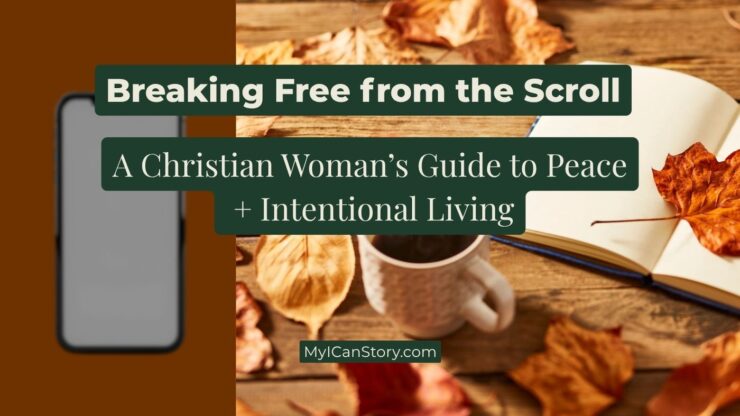Breaking Free from the Scroll: A Christian Woman’s Guide to Peace + Intentional Living
What Is Phone Addiction? Everything Christian Women Need to Know About Breaking the Scroll
We’ve all been there.
I told myself the other night I’d just check Instagram for “five minutes.” Forty-five minutes later, I was still there — scrolling reels, laughing at silly videos, and, honestly, feeling a little worse than when I started. Sound familiar?
It’s easy to think phone overuse is just “a bad habit.” But what’s happening to us when we can’t stop scrolling goes deeper. It shapes our thoughts, steals our peace, and keeps us distracted from the life God has called us to live.
And the world has noticed. Schools across the country are banning phones during class, states are passing new laws to restrict student use, and research keeps confirming what many of us feel: we’re more anxious, more distracted, and less present than ever.
So, let’s ask the big question: What is phone addiction, and how do we break free from the scroll?
What Is Phone Addiction?
Phone addiction, sometimes called nomophobia (fear of being without your phone), isn’t just about spending lots of time online. It’s the compulsive need to check your phone, scroll social media, and consume endless content — even when it doesn’t make you happy.
Researchers describe it as a type of behavioral addiction, where the dopamine hits from notifications, likes, and new content keep us hooked (Andreassen, 2015). The endless scroll never ends because it was designed that way — apps refresh infinitely, keeping your brain looking for “the next thing.”
For Christians, this isn’t just a mental health issue. It’s a spiritual one. Jesus calls us to peace, presence, and purpose. Yet when our attention is glued to our phones, we often miss His still, small voice.
What the Research Says About Scrolling
Studies are piling up on the consequences of phone overuse:
- Anxiety & depression: Heavy social media use has been linked to increased symptoms of anxiety and depression, especially among young adults (Twenge & Campbell, 2018).
- Sleep problems: Late-night scrolling disrupts sleep cycles and increases insomnia (Levenson et al., 2017).
- Attention span decline: One Microsoft study found our average attention span dropped to just 8 seconds in the digital age — shorter than a goldfish’s (Microsoft, 2015).
- Productivity loss: Constant interruptions from notifications can take more than 20 minutes to fully recover from (Mark et al., 2008).
No wonder schools are stepping in. According to the National Center for Education Statistics, more than three-quarters of U.S. schools now restrict phone use during class (NCES, 2023). Lawmakers in states like Florida have even banned phones in classrooms altogether, citing both mental health concerns and the need to improve focus.
If students need boundaries, don’t we as adults?
Why Christians Need to Care
Scrolling isn’t just wasting time. It’s shaping who we are becoming.
- Spiritually: Scrolling often fuels comparison. Instead of gratitude, we slip into envy, wishing our lives looked like someone else’s highlight reel. Jesus said, “Where your treasure is, there your heart will be also” (Matthew 6:21). If our treasure is found in likes, our heart will follow.
- Emotionally: The constant noise of news, memes, and reels increases anxiety. Proverbs 12:25 reminds us, “Anxiety weighs down the heart, but a kind word cheers it up.”
- Relationally: We miss real connection. A 2019 study found that simply having a phone on the table during a meal decreases meaningful conversation (Przybylski & Weinstein, 2019).

We weren’t created to live distracted. We were created for presence — with God, with our families, and with our communities.
Steps to Break the Scroll
Breaking free doesn’t happen overnight, but small, intentional steps can lead to lasting change. Here are practical (and fun!) ways to start:
1. Set Tech Boundaries
- Start and end your day without your phone. Try leaving it in another room at night.
- Turn off non-essential notifications. That “ding” is designed to hook you.
2. Replace Scrolling With Life-Giving Alternatives
This is key: don’t just take something away. Add something better.
- Faith practices: Instead of endless reels, spend five minutes journaling a prayer or reading a psalm. Not out of guilt, but as a refresh for your soul.
- Fun hobbies: Try something hands-on like crocheting (yes, it’s making a huge comeback), painting, baking, or puzzles. Outdoor hobbies like hiking, photography, or gardening help you reconnect with creation.
Need inspiration? Check out Pinterest boards or articles like 50 Fun Hobbies for Women in Their 20s for ideas. - Seasonal activities: Fall is perfect for this. Visit a pumpkin patch, go apple picking, or simply take a walk in the crisp air with a warm drink. Even if you go alone, it’s restorative.
3. Choose Real Connection Over Digital Connection
- Call or text a friend instead of just liking their post.
- Invite someone for coffee. Chances are, they miss you more than you realize.
- Volunteer or join a small group at church — connection multiplies when you’re present.

4. Renew Your Mind (Romans 12:2)
Paul reminds us, “Do not conform to the pattern of this world, but be transformed by the renewing of your mind.” Breaking phone addiction starts here — with retraining our thoughts. Instead of worrying about what you’ll “miss out” on, ask:
- Who do I want to become?
- What kind of life do I want to build in Christ?
The scroll will never stop. But you can.
The Benefits of Breaking Free from Phone Addiction for Christians
When you limit your screen time, you gain more than you lose:
- Peace of mind: less anxiety and information overload.
- Deeper faith: more space to hear God’s voice.
- Better sleep & health: fewer late nights staring at a screen.
- Stronger relationships: presence with people who matter.
- Clarity of purpose: rediscovering passions and hobbies that bring life.
Key Takeaways about Phone Addiction
- Phone addiction is real — and it’s shaping our thoughts, emotions, and faith.
- Research shows it fuels anxiety, distraction, and poor sleep.
- Christians must be intentional to avoid letting the scroll steal peace and purpose.
- Breaking free starts with boundaries, fun alternatives, real connection, and renewed thinking.

Final Word: If Not Now, When?
Here’s the truth: the scroll will always be there. But this season — this fall — is fleeting.
Don’t let another month slip by while your best moments are swallowed by a glowing screen. Step outside, pick up a new hobby, call a friend, dive into God’s Word. Create small, decisive, and fun steps that lead to lasting change.
If not now, then when?
Jesus said, “I have come that they may have life, and have it to the full” (John 10:10). That full, abundant life isn’t found in your newsfeed. It’s found in Him.
References
- Andreassen, C. S. (2015). Online social network site addiction: A comprehensive review. Current Addiction Reports.
- Twenge, J. M., & Campbell, W. K. (2018). Associations between screen time and lower psychological well-being among children and adolescents. Preventive Medicine Reports.
- Levenson, J. C., Shensa, A., Sidani, J. E., Colditz, J. B., & Primack, B. A. (2017). Social media use before bed and sleep disturbance among young adults. Preventive Medicine.
- Microsoft. (2015). Attention spans. Consumer Insights Report.
- Mark, G., Gudith, D., & Klocke, U. (2008). The cost of interrupted work: More speed and stress. Proceedings of CHI.
- National Center for Education Statistics (2023). School Pulse Panel.
- Przybylski, A. K., & Weinstein, N. (2019). Digital screen time limits and young children’s psychological well-being. Child Development.
What do you think about scrolling? If you’ve made it this far, then you know what it’s doing. We haven’t even talked about the physical aspects and how it messes with your hands and eyes. Tell us in the comments below, how much time do you spend each day on your phone just scrolling? Which of the steps do you relate most to?
Give us a like and share with a friend. Subscribe to our weekly post for more great peace-giving ideas for better health.
Here’s one of my favorite blog post: Rewrite Your Story with God’s Vision, Not Just Your To-Do List
And, don’t forget to visit our other great resources for more ideas for peace: https://myicanstory.com/resources/
Discover more from My I Can Story
Subscribe to get the latest posts sent to your email.




